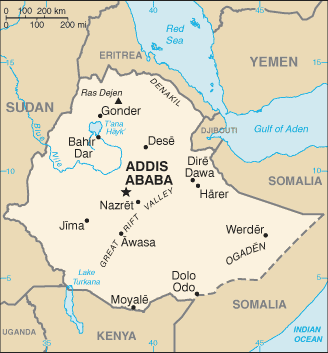Ethiopian Government Denies Arrest of Opposition Party Activists
By William Davison (Bloomberg) — Ethiopia’s government denied claims by the opposition that political activists in state of Oromia have been arrested in recent weeks as part of a crackdown to pre-empt potential anti-government protests.
Those arrested were members of the Asmara, Eritrea-based Oromo Liberation Front, government spokesman Shimeles Kemal said in a phone interview. “They have been trained and sent here from Eritrea a few months back,” he said. “They have been sent out to carry out terrorist activists and have been apprehended.”
Oromos are the largest ethnic group in Ethiopia, though national politics in the country have been dominated for centuries by politicians and feudal lords from the smaller Amhara and Tigrayan ethnic groups. The outlawed ONLF has waged a 38-year campaign for autonomy in Oromia, the largest of Ethiopia’s nine federal states.
The action by the federal police has been taken to neutralize the risk of anti-government protests similar to those sweeping North Africa and the Middle East from erupting, Bekele said. Activists have been detained by policemen who sometimes used vehicles without registration plates, in towns including Jimma, Nekemte, Burayu, Holeta and Sebeta, he said.
Demonstrations
No anti-government demonstrations are planned because any violence is “not in the interests of our people,” Bekele said. “We know who the army belongs to.”
Shimeles said the government arrested 200 rebels, who have been denied bail and are being detained while evidence is collected to prosecute them.
The government has been arresting members of legal political organizations and suspected members of the OLF, the rebel group said in a March 27 e-mailed statement from Asmara.
“It is clear that the current alarming mass arrest of the Oromo individuals is a sign of desperation of the TPLF regime,” it said.
Oromos make up 34.5 percent of Ethiopia’s population of 90.9 million people, according to the CIA World Factbook.
The detainees, who include students, teachers and former parliamentary candidates, are being held in Central Prison without access to lawyers, or being allowed to receive visitors, according to Bekele.
“The very existence of these organizations is testimony that political pluralism exists in Ethiopia,” Shimeles said. “No-one will be prosecuted for pursuing different political policies to the ruling party.”
The ruling Ethiopian People’s Democratic Revolutionary Democratic Front, led by Prime Minister Meles Zenawi, and allied parties won all but three of 547 parliamentary seats in a May election. Security forces killed at least 193 people protesting the results of Ethiopia’s 2005 elections.



Average Rating